“Ebola deaths are horrendous!”
Gyude Moore ’06 did not mince words in a letter he wrote at the height of the Ebola crisis in September of 2014. Recounting the distress he and other citizens of Liberia were experiencing, he wrote, “It’s hell here. Two days ago some lady with a nine-year-old and a six-month-old passed. Her husband had died from the disease and she took care of him. She got sick and the nine-year-old took care of her. Now she’s dead and both children have Ebola. Seriously, how does one go to sleep with this kind of information?”
Gyude’s sentiments contain equal parts of compassion and passion. His compassion springs from spiritual depths of his own faith and past experiences of poverty, grief and loss. His passion, which draws from those same sources, is undeniable and impressive to everyone who encounters him.
Perhaps this combination explains how in only 10 years of public service, Gyude built a resume that would be the envy of many senior diplomats. Among his many accomplishments, he can list graduate of the School of Foreign Service at Georgetown, OxFam CHANGE leader, senior aid in the Office of the President and currently Minister of Public Works in Liberia.
However, he is no stranger to trying times; rather, he embodies the idea that great goodness can come out of great difficulties. Like many Liberians, his family was greatly affected by his country’s widespread poverty, economic instability, political strife and warfare. Liberia suffered two civil wars during his early years, the first from 1989-1996 and the second from 1999-2003. Recounting his youth, Gyude says, “Before the war we were relatively OK. The war changed everything.”
During the war, marauders came to Gyude’s village, where they pillaged, massacred neighbors, and burned his father’s house. His family fled war-torn Liberia to seek refuge in the Ivory Coast. A pivotal moment for Gyude occurred when his sister died during their flight from the rebels. “My mother had given birth to twins a week before the attack and with no vehicle, we had to trek the 25 or more miles to the Liberian-Ivorian border. We took whatever belongings we could and carried them on our heads. The entire road was jam packed with people like us, fleeing for their lives. I carried one of the twins, the boy, on my back and my mother carried the other, a girl. The stress of the journey overwhelmed my baby sister and she passed that night.”
Their grief was accompanied by want. “We had to depend on rations from the United Nations High Commission for Refugees,” Gyude recalls. “In many instances I had to sell some of the rations to pay rent. It was a very difficult time.” But in spite of such difficulties, Gyude acknowledges, “I was fortunate to miss the multiple bouts of cholera that ravaged the refugee population.”
Such tragedies might defeat some, but Gyude says that listening to his mother’s sobs of anguish in darkness the night his sister died “prompted me to promise that I would work for a world where kids and their mothers would be protected from such horrors. It was a vague promise, but service organizations seemed like a good place to start, so I did.”
His involvement in service organizations took a leap forward when Gyude arrived in America. “I think I came to America for the same reason every immigrant has come here. It was a land of opportunity. Before coming to America, going to school was an end in itself since there was really no future. America provided a future – something to hope for, to live for.”
Gyude recalls coming to Berea College: “In 2002, I was one of 29 international students accepted from over 3,000 applicants to receive a scholarship at Berea.” Professors like Mike Rivage-Seul and Michelle Tooley made a particular impact on him. “Mike and Michelle were activists. They encouraged us to question power structures. They created the impression that it was not a problem when you challenged injustice, it was rather odd if you didn’t. They enabled me.”
As a student majoring in political science and economics, service was central to Gyude’s Berea College experience. He was selected as a Bonner Scholar because he met the program’s requirements of commitment to service, demonstrated leadership, scholastic ability and maturity. As the program’s first international scholar, he worked with the homeless in Louisville and AIDS education with youth in Washington, D.C.
As a Bonner Scholar, Gyude attended a workshop by Oxfam America, the international humanitarian organization focused on finding solutions to poverty, hunger and social injustice. “Here was an organization working to create the world I had envisioned as a refugee kid,” he says, adding, “It was there that I met Liz Carty from Oxfam America, who encouraged me to apply to become an Oxfam CHANGE leader. The rest, like they say, is history.”
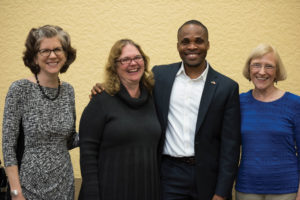
That “history” is something Betty Hibler, the now-retired associate director of the Center for Excellence in Learning Through Service (CELTS), knows very well. “Gyude participated in an Oxfam leadership program on becoming a CHANGE leader, which was a big turning point,” Hibler says. “After that, Gyude became a sought-after speaker.” While still a student, he addressed the United Nations as a panelist during the Tomorrow’s Leaders’ Today forum, the World Youth Leadership Network in New York, the Inter-American Forum in Florida, and facilitated a workshop at the 16th Annual Nobel Peace Prize Winners’ Forum at St. Olaf College in Minnesota.
Gyude recalls his first off-campus speaking engagement: “Michelle Tooley, who believed in me before I actually began to believe in myself, was with me at St. Olaf at the Nobel’s Peace Prize Winner’s conference. She believed I had an incredible voice, a perspective that needed to be heard. She remains with me – a guiding light. She was my friend, my mentor, my mother, my teacher, my inspiration.”
Dr. Tooley, Berea’s Eli Lilly Professor of Religion who passed away before this article was completed, said of him, “Gyude’s faith and his deep conviction that the world is not the way it should be are important catalysts for his economic justice work. He understands different kinds of people and empowerment and practices listening skills that help him find common ground with people. Although he is an excellent speaker, he doesn’t try to dazzle his audience, but speaks out [of] a deep passion for social justice, grounded in good analysis.”
After graduation from Berea College, Gyude pursued graduate studies at the School of Foreign Service at Georgetown before eventually returning to Liberia.
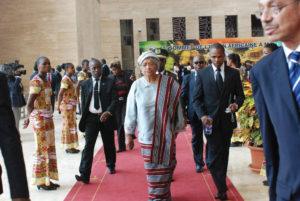
For two years, Gyude served in the Liberian government as deputy chief of staff/head of the Program Delivery Unit in the Executive Office of the President. From 2009 until 2012, he was senior aide in the Office of the President. In describing his government work he says, “It was a journey. I remember the first time I tried to be helpful. President Ellen Johnson Sirleaf, the first elected female head of state in Africa, was not very welcoming. It’s funny now in hindsight. But they were working on her Annual Message (like your State of the Union) and I was there helping. She came in and saw me, and gave me that ‘what are you doing here?’ look.” But Gyude stayed and the next year, her speech was written on an outline he had crafted.
Gyude’s loyalty and work ethic earned the president’s respect. In December 2014, President Sirleaf appointed Gyude to her cabinet as Minister of Public Works. In that role he oversees the country’s largest allotment in national budget to oversee infrastructure programs such as roads, energy plants, hospitals, shipping ports, and airports.
“I went from aide in the President’s Office, to senior aide, to special assistant to the President’s chief of staff, to deputy chief of Staff and head of the President’s Delivery Unit. Now I’m minister of public works. Pretty incredible six years!” Gyude says balancing pride with humility.
“I worked hard. I was disciplined. I was there when she arrived in the morning and was one of the last when she left,” Gyude continues. “I took on tasks that needed to be done. I prepared briefs for meetings. I kept taking on more responsibilities and delivering and ultimately became one of the president’s closest aides and advisers.” At his wedding, President Sirleaf, a mother of four sons, toasted the couple and called Gyude her “fifth son.”
Serving as minister of public works put Gyude at the epicenter of the Ebola crisis in Liberia. Ebola outbreaks had spread from Guinea into Liberia, first in rural areas, then in urban areas where it was difficult to trace the contact trail. Because early symptoms of the disease mimicked more common tropical diseases, such as malaria and cholera, outbreaks often went undetected until too late.
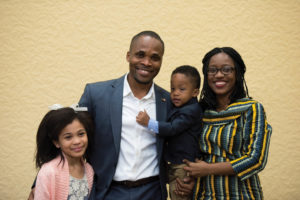
Gyude’s wife, Lakshmi, who works for an international anti-poverty organization, was in the U.S. giving birth to their son. She described the heartbreaking challenges – private and public – that her husband and their country faced, saying, “Gyude lost friends, family members of friends and colleagues.” She said that seemingly simple things, such as a lack of gloves and other protective gear for healthcare workers, contributed to the crisis. No routine protocols were already in place, so the burgeoning number of Ebola cases put the nation’s health system in crisis and healthcare workers at risk. The existing health system, which had a ratio of one doctor for every 100,000 citizens, was overrun, and many of the early victims were healthcare workers who had treated Ebola patients.
“I think it’s difficult for people who have never been at the center of such an outbreak to appreciate what a harrowing experience it is,” Gyude said of the impact the crisis was having on the Liberian people and their culture. “Imagine schools closing, offices closing except for a few essential staff. Imagine you can’t shake hands or touch other people. Imagine you can’t play sports or engage in any group activity in which people might sweat. Imagine you come to work and are suspicious of your coworkers because you don’t know if they’re taking care of a sick relative at home. Imagine sitting up one night and accepting that you would die, that it was only a matter of time because you couldn’t be careful one hundred percent of the time. It was a terrifying experience.”
Throughout the crisis, Gyude was an ardent ally with President Sirleaf in appealing for global assistance. “I was with the president when she made the decision to directly request assistance from the U.S. and Chinese governments,” he said. “Then we shared copies of her letter with some of our friends on Capitol Hill. I believe Sen. Leahy read President’s Sirleaf’s letter on the floor of the Senate. The contents of the letter also appeared in the New York Times. As each world leader received our request, major papers in their country carried the letter and asked what the government was doing to help. It was a satisfying experience knowing that those efforts would lead to a response.”
Gyude also took other actions. He wrote an open letter published by the Center for Global Development, spoke about the Ebola crisis along with Senator Jeff Flake in Washington, D.C., and conducted an interview on National Public Radio. Confronting the crisis required a total effort, Gyude says, noting that “other members of the Liberian government and friends of Liberia were also using their contacts to do as much as they could. And every bit counted.”
Even with the country’s borders closed, the spiraling number of Ebola cases put a strain on basic services. There was a lack of beds and too few Ebola Treatment Units (ETUs), which provided isolation and infection control protocols throughout the 21-day quarantine for patients. Gyude pointed out that due to the incubation period of the disease, if patients could not access ETUs, they simply went home, where family members and caregivers likely would become the next victims. Recognizing the critical need for ETUs, he was quoted at the time, “I go every day and try to see if we can speed up the ETUs. But even there we have problems. Were we to eventually scale up to 1,000 beds, there’s not enough medical staff trained to run these units.”
As the death toll continued to rise in Liberia and its neighboring West African nations, an impassioned plea for help was made to the U.S., Russia, Japan, Germany, Brazil, China, Canada, South Africa and Australia. It was a distress call that stated in part, “We need help. If we don’t build at least 1,000 beds in the next week and a half, we will be so far from shore in these uncharted waters, I struggle to imagine we would return to land. Whatever you can do, whoever you know, we need help. We really do. We are running out of time.”
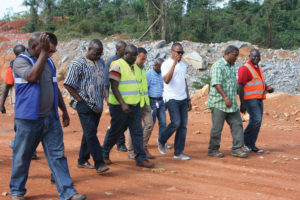
The appeals for aid were effective and the response was tremendous. Help came from many nations and organizations, including Berea College students who initiated fundraising events to buy protective gear for Doctors Without Borders (Médecins Sans Frontières). “It was a source of great pride that my alma mater would reach out to assist my country in our time of need,” Gyude said. “Obviously, it was not Berea’s first foray into assisting Liberia in time of great upheaval. Berea once played hosts to Liberian students who were allowed to finish their education when their lives were disrupted by the war in the early ’90s. I love that Berea raised funds to help with Ebola.”
Gyude returned to Berea’s campus this spring to receive the 2016 Berea College Service Award and speak at the service convocation. Established in 1979, the award recognizes individuals who have provided outstanding service to society in achieving the ideals of Berea’s Great Commitments. In his speech, he addressed the persistent patterns of power and privilege in communities that are perpetuated through enforcement of clear lines of separation or “margins.” He reminded his audience that by virtue of their education they each have a unique opportunity to erase those lines and prevent the marginalization of others in its many forms.
“There is something quintessentially American about Berea,” Gyude reflects. “It demands you ask questions; that you do not accept things simply as they are. Berea was like that. [I] loved it here. So when I went back home where youth is seen, but not usually heard, I was different.”
And because of Gyude, so is Liberia and so is the world.


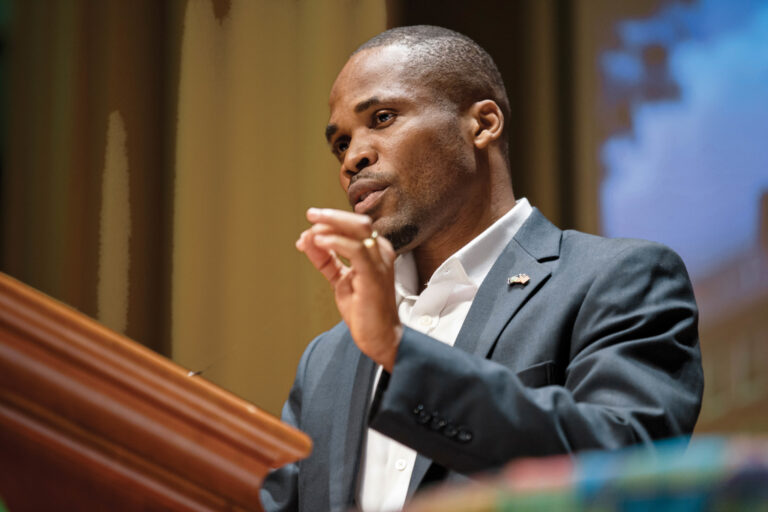
I watched his presentation “China in Africa: An African Perspective” of 25 March 2019 and felt he has very balanced views and ability to create strategy.
Such are the leaders we require in Africa